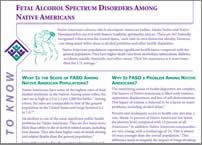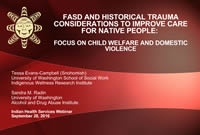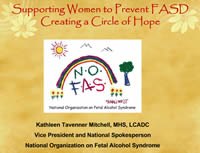Resources for Native Communities
In this section: FASD from a tribal perspective | Strategies for Native communities
This section contains written information, videos, and webinars that are especially relevant for Native Communities and/or Educators serving Native students. Several personal stories are shared through video.
FASD from a tribal perspective
Written materials
 Fetal Alcohol Spectrum Disorders Among Native Americans (pdf, 2p.)
Fetal Alcohol Spectrum Disorders Among Native Americans (pdf, 2p.)
U.S. Department of Health and Human Services (DSHS) (2007)
Factsheet that describes the scope of FASD among Native Americans, an overview of FASD, and what is being done to address the issue.
Weaving a Resilient Basket of Hope & Filling It With Tools of Help (pdf, 83p.)
Suzie Kuerschner, MEd, FASD Consultant and Trainer
This manual integrates traditional and clinical knowledge to provide a foundation "from which parents, social service providers, educators, and trainers can form their own prevention and intervention strategies."
Webinars
 FASD and Historical Trauma Considerations to Improve Care for Native People: Focus on Child Welfare and Domestic Violence (60 min.)
FASD and Historical Trauma Considerations to Improve Care for Native People: Focus on Child Welfare and Domestic Violence (60 min.)
Hosted by the Indian Health Services (IHS) TeleBehavioral Health Center of Excellence (2016)
Presented by Tessa Evans-Campbell, PhD (Snohomish) and Sandra Radin, PhD, this webinar describes the contexts of FASD, historical trauma, and grief and how they relate to maternal and child health. (more  )
)
Videos
My Story on FAS (5 min.)
Kaylynn Jehn openly shares her personal story.
Morgan Fawcett on Living with FASD (7 min.)
Morgan's story of the helpful impact of his diagnosis (produced by NOFAS).
Other resources
Northwest Tribal Fetal Alcohol Spectrum Disorder Project
Northwest Portland Area Indian Health Board (NPAIHB)
This project seeks to reduce the incidence of FASD and to assist tribal communities to improve the quality of life of those living with FASD. Project site features resources, data/statistics, reports and media materials, and related websites. (more  )
)
Strategies for Native communities
Written materials
Life is Sacred: Invite It, Nurture It, Celebrate It (pdf, 6p.)
Suzie Kuerschner, MEd, FASD Consultant and Trainer
This printable handout can be used by a person with FASD (or their caregiver) to advocate for themselves when working with educators or other professionals.
An Indigenous Framework of the Cycle of Fetal Alcohol Spectrum Disorder Risk and Prevention Across the Generations: Historical Trauma, Harm, and Healing (pdf, 39p.)
Gonazels K, et al. Ethnicity & Health, 2021;26(2). Preprint published by the OHSU-PSU School of Public Health
In this paper, the authors report knowledge and attitudes about FASD, perspectives on FASD risk factors, and culturally relevant approaches to FASD prevention as learned through community-based participatory research with American Indian and Alaska Native (AI/AN) peoples living in Multnomah County, Oregon.
Webinars
 Supporting Women to Prevent FASD: Creating a Circle of Hope (75 min.)
Supporting Women to Prevent FASD: Creating a Circle of Hope (75 min.)
Hosted by the Indian Health Services (IHS) TeleBehavioral Health Center of Excellence (2014)
Presented by Kathleen Mitchell, MHS, LCADC, and Daphne Colacion, MA, this webinar discusses how creating environments that support and empower women can help prevent FASD. (more  )
)
FASD and Suicide: A Native American Community's Response (56 min.)
Hosted by the Indian Health Services (IHS) TeleBehavioral Health Center of Excellence (2014)
Presented by Thea Wilshire, PhD, and Gerilyn Goseyun, this presentation outlines the concerted efforts and successful interventions made by a Southwest Tribe to reduce suicide after losing several young people in a short period of time. (more  )
)
Videos
Parenting with FASD (14 min.)
Presented by the Inter Tribal Health Authority (ITHA) and Maternal Child Health (MCH) Program. Mentors from the SOAR program describe home visiting strategies that work with First Nations families.
